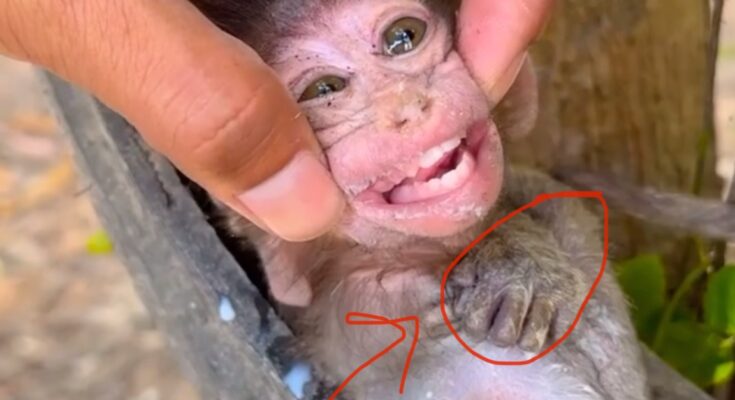Newborn monkeys, like many young mammals, have extremely delicate skin that is highly sensitive to environmental changes, parasites, and grooming habits. Because of their thin epidermal layer and developing immune systems, even minor irritants can lead to persistent itching, discomfort, or skin infections. Preventing itchy skin in newborn monkeys is essential not only for their physical well-being but also for their emotional development, as prolonged irritation can affect feeding, bonding, and overall behavior. Below are effective, humane, and scientifically supported methods to keep newborn monkeys’ skin healthy and itch-free.
1. Maintain a Clean and Controlled Environment
The first and most crucial step in preventing itchy skin is to ensure that the newborn’s living space is clean and stable. Monkeys are extremely sensitive to humidity, dust, and temperature fluctuations. Their bedding should be changed regularly, preferably daily in the early weeks, to prevent the accumulation of bacteria or fungi. Humidity levels should stay moderate—too much moisture can encourage fungal growth, while overly dry conditions can lead to flaky and itchy skin. Regular sanitization of cages, nests, and enrichment items helps reduce exposure to allergens and parasites.
2. Provide Proper Grooming and Gentle Cleaning
In the wild, mother monkeys groom their infants frequently, removing dirt, dead skin, and insects from their fur. For newborn monkeys in captivity or rehabilitation centers, caretakers may need to gently replicate this grooming behavior. Soft, damp cloths with warm water are usually enough for mild cleaning, while harsh soaps should be avoided as they strip natural oils and irritate the skin. If a mild cleanser is necessary, only products made specifically for sensitive animal skin should be used. Regular grooming not only prevents itch-causing buildup but also supports bonding and reduces stress.
3. Control Parasites Early
Parasites such as mites, fleas, or ticks are among the most common causes of itchiness in young monkeys. Newborns are especially vulnerable because they cannot groom themselves effectively. Caretakers should inspect infants frequently for signs of parasites—scratching, redness, or small dark specks in the fur. Safe, veterinarian-approved treatments should be administered when necessary. Additionally, treating adult monkeys in the group helps prevent reinfestation, as parasites spread quickly in social primate environments.
4. Ensure a Balanced Diet Rich in Skin-Supporting Nutrients
Nutrition plays a major role in maintaining healthy skin. A newborn monkey’s diet should be rich in vitamins A, E, and omega-fatty acids, all of which support skin elasticity and hydration. For infants still nursing, caretakers should make sure the mother’s diet is appropriate, as her nutritional status directly affects the quality of her milk. Proper hydration is equally important; dehydration can quickly lead to dry, itchy skin.
5. Avoid Exposure to Irritating Materials
Certain bedding materials, detergents, or cleaning agents can trigger skin reactions. Cotton or soft natural fibers are ideal for bedding, while scented or chemical-rich cleaning solutions should be avoided. Even some plant materials commonly used in nesting can irritate newborn skin, so caretakers must observe how infants respond to their environment and adjust accordingly.
Conclusion
Preventing itchy skin in newborn monkeys requires a combination of good hygiene, proper nutrition, parasite control, and gentle grooming practices. By creating a safe and carefully monitored environment, caretakers can ensure that infants grow comfortably, form strong bonds, and develop into healthy, thriving adult monkeys.



